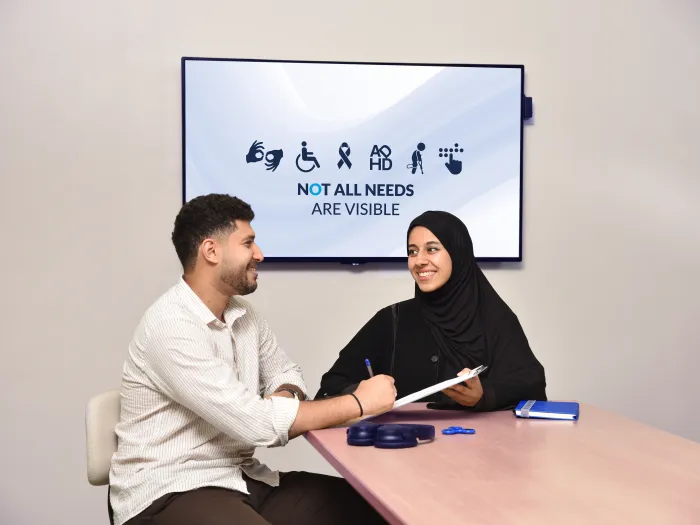
Tailored, Inclusive Support for Your Academic Success
At UDST, we are committed to creating a learning environment where all students have an equal opportunity to succeed. We proudly support applicants, current students, and CPE (Continuing and Professional Education) students who have diagnosed physical, psychological, or learning-related conditions, supported by valid medical documentation from a licensed healthcare provider.
Accessibility Services advocates for equitable access to education through individualized accommodations, guided by Qatar's disability laws, including Law No. 2 of 2004 and Law No. 22 of 2025. These laws ensure students with disabilities are protected from discrimination, have access to inclusive education, and can fully participate in academic life. By working closely with students, faculty, and campus partners, we aim to foster a truly inclusive and empowering academic experience.
Not sure what you might qualify for? We’re here to help you explore your options. Accommodations are determined based on your documentation and a collaborative discussion with our Accessibility Services team.
Discover What Accessibility Can Unlock for You:
Separate space for assessments – Allows students to take assessments in a distraction-reduced environment.
Extended time – Provides additional time for assessments.
Modified formats – Provide course and assessment materials in accessible formats such as large print, double spacing, colored paper, or electronic versions compatible with ZoomText, magnifiers, or audio tools.
Frequent breaks– Permits breaks during assessments to manage fatigue, anxiety, or medical needs.
Assessments scribe – Provides a person or technology (such as speech-to-text software) to write or type answers as dictated by the student for both paper-based and computer-based assessments.
Assessment clarification – Allows students to ask for clarification of instructions or questions.
Assessments administered in sections with supervised breaks – Divides assessments into manageable parts with scheduled breaks between.
Reference materials – Use of individualized resources to support students with memory or executive function challenges.
Separate setting for individual oral presentations – Recommends a private or smaller setting for students to deliver presentations.
Preferred seating – Enables students to choose seating that best supports their learning (e.g., near the front, close to exit, near power outlets, in a quieter area, or away from distractions).
Allowed devices:
Phone/Smartwatch allowed in class – Permits use of phone or smartwatch for accessibility apps, medical monitoring (such as blood glucose tracking), or emergency communication during class.
Laptops/Tablets - Allows use for live transcription, recording lectures, note-taking, and other activities that support diverse learning styles.
Noise-cancelling devices - Supports focus, reduces sensory overload, and assists with audio accommodations or emotional regulation.
Other assistive devices – Includes tools such as smartpens, screen magnifiers, or FM systems, permitted based on individual needs.
Accessible furniture and workspace – Provides ergonomic and mobility-friendly seating and desks.
Permission for breaks and re-entry – Allows students to manage health or emotional needs during class.
Modified seating– Offers ergonomic or adaptive seating and adjustable furniture for physical disabilities or chronic pain.
Use of sensory items – Allows calming or stimulating sensory tools to aid focus.
Accessible washroom access – Ensures student has access to specialized accessible restrooms.
Accessible study stations – Reservable study stations equipped with assistive technology and adaptive equipment.
Voice-to-text software – Enables students to speak responses, which are converted into written text for assignments or assessments.
Text-to-voice software – Enables written text to be converted to audio to support reading, comprehension, or focus.
Free Assistive Technology Devices – Access a wide range of tools at no cost, including screen readers, OCR scanners, specialized keyboards, adaptable mice, large screens, electronic magnifiers, and portable magnifiers with dual functionality for zooming on both distant and nearby objects.
One-on-One AT consultations - Get expert support to identify learning barriers, explore assistive tools, try guided demos, and discuss personalized support options.
Priority registration – Permits early course registration to better coordinate class schedules and accessibility needs.
Reduced course load – Allows students to take fewer courses per term.
Flexible coursework submission – Provides extensions or alternate formats for submitting coursework.
Attendance flexibility – Allows for flexibility in attendance on a course-by-course basis in agreement with the college.
Accessible parking – Grants access to priority or accessible parking spaces near campus buildings.
Invisible disability symbol on student ID card – A discreet visual identifier that can help students signal their need for support or accommodations in various settings across campus.
Medication storage/refrigeration - Access to secure, refrigerated storage for insulin, infusions, and other temperature-sensitive medications.
Students registered with Accessibility Services have priority access for peer tutoring program with Academic Learning Services (ALS), ensuring tailored academic support to meet their learning needs.
Key Features Include:
- Priority access - Priority access for peer tutoring program with ALS.
- Individualized support - One-on-one academic assistance tailored to each student’s needs.
- Flexible scheduling - Tutoring sessions are scheduled to accommodate students’ timetables.
- Integration with assistive services - Tutors can be trained to support the use of assistive technologies.
- Confidential and supportive environment - Sessions are conducted in a safe, confidential space to encourage learning and academic confidence.
How to Request Accommodations?
Schedule an appointment with Accessibility Services so we can discuss your specific needs and guide you through the process.



